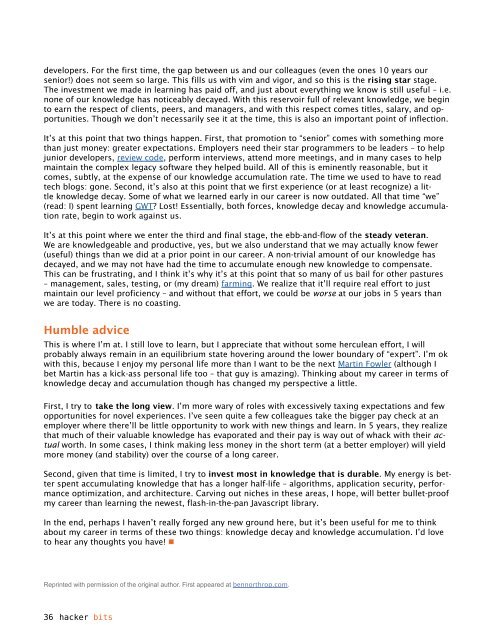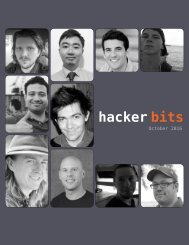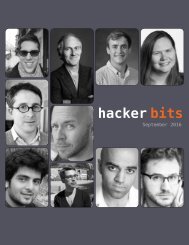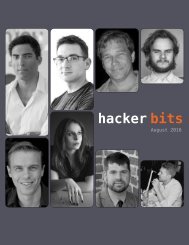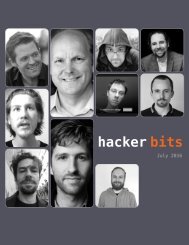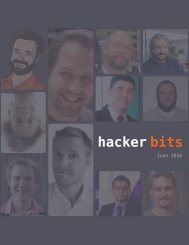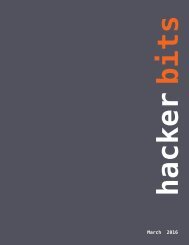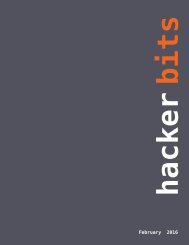Hacker Bits, Issue 11
HACKER BITS is the monthly magazine that gives you the hottest technology stories crowdsourced by the readers of Hacker News. We select from the top voted stories and publish them in an easy-to-read magazine format. Get HACKER BITS delivered to your inbox every month! For more, visit https://hackerbits.com/issue11.
HACKER BITS is the monthly magazine that gives you the hottest technology stories crowdsourced by the readers of Hacker News. We select from the top voted stories and publish them in an easy-to-read magazine format.
Get HACKER BITS delivered to your inbox every month! For more, visit https://hackerbits.com/issue11.
Create successful ePaper yourself
Turn your PDF publications into a flip-book with our unique Google optimized e-Paper software.
developers. For the first time, the gap between us and our colleagues (even the ones 10 years our<br />
senior!) does not seem so large. This fills us with vim and vigor, and so this is the rising star stage.<br />
The investment we made in learning has paid off, and just about everything we know is still useful – i.e.<br />
none of our knowledge has noticeably decayed. With this reservoir full of relevant knowledge, we begin<br />
to earn the respect of clients, peers, and managers, and with this respect comes titles, salary, and opportunities.<br />
Though we don’t necessarily see it at the time, this is also an important point of inflection.<br />
It’s at this point that two things happen. First, that promotion to “senior” comes with something more<br />
than just money: greater expectations. Employers need their star programmers to be leaders – to help<br />
junior developers, review code, perform interviews, attend more meetings, and in many cases to help<br />
maintain the complex legacy software they helped build. All of this is eminently reasonable, but it<br />
comes, subtly, at the expense of our knowledge accumulation rate. The time we used to have to read<br />
tech blogs: gone. Second, it’s also at this point that we first experience (or at least recognize) a little<br />
knowledge decay. Some of what we learned early in our career is now outdated. All that time “we”<br />
(read: I) spent learning GWT? Lost! Essentially, both forces, knowledge decay and knowledge accumulation<br />
rate, begin to work against us.<br />
It’s at this point where we enter the third and final stage, the ebb-and-flow of the steady veteran.<br />
We are knowledgeable and productive, yes, but we also understand that we may actually know fewer<br />
(useful) things than we did at a prior point in our career. A non-trivial amount of our knowledge has<br />
decayed, and we may not have had the time to accumulate enough new knowledge to compensate.<br />
This can be frustrating, and I think it’s why it’s at this point that so many of us bail for other pastures<br />
– management, sales, testing, or (my dream) farming. We realize that it’ll require real effort to just<br />
maintain our level proficiency – and without that effort, we could be worse at our jobs in 5 years than<br />
we are today. There is no coasting.<br />
Humble advice<br />
This is where I’m at. I still love to learn, but I appreciate that without some herculean effort, I will<br />
probably always remain in an equilibrium state hovering around the lower boundary of “expert”. I’m ok<br />
with this, because I enjoy my personal life more than I want to be the next Martin Fowler (although I<br />
bet Martin has a kick-ass personal life too – that guy is amazing). Thinking about my career in terms of<br />
knowledge decay and accumulation though has changed my perspective a little.<br />
First, I try to take the long view. I’m more wary of roles with excessively taxing expectations and few<br />
opportunities for novel experiences. I’ve seen quite a few colleagues take the bigger pay check at an<br />
employer where there’ll be little opportunity to work with new things and learn. In 5 years, they realize<br />
that much of their valuable knowledge has evaporated and their pay is way out of whack with their actual<br />
worth. In some cases, I think making less money in the short term (at a better employer) will yield<br />
more money (and stability) over the course of a long career.<br />
Second, given that time is limited, I try to invest most in knowledge that is durable. My energy is better<br />
spent accumulating knowledge that has a longer half-life – algorithms, application security, performance<br />
optimization, and architecture. Carving out niches in these areas, I hope, will better bullet-proof<br />
my career than learning the newest, flash-in-the-pan Javascript library.<br />
In the end, perhaps I haven’t really forged any new ground here, but it’s been useful for me to think<br />
about my career in terms of these two things: knowledge decay and knowledge accumulation. I’d love<br />
to hear any thoughts you have! •<br />
Reprinted with permission of the original author. First appeared at bennorthrop.com.<br />
36 hacker bits


